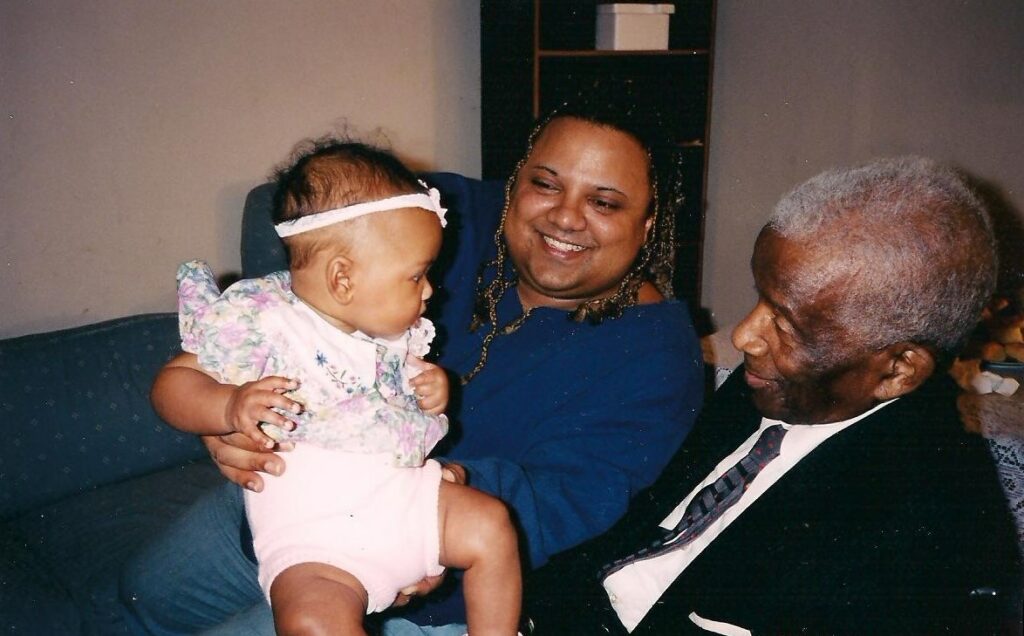
Photo: Kayla Moore with her niece and grandfather.
Interview with Maria Moore
Kayla Moore, a Black transgender woman, was killed in her apartment by Berkeley police in 2013. Kayla had a history of schizophrenia and was in the middle of a mental health crisis when the police were called to perform a wellness check. Instead, they tried to arrest her. Kayla stopped breathing after half a dozen police officers forcibly held her down.
The following is an edited excerpt from a longer interview with Maria Moore, Kayla’s sister. She spoke with KPFA outdoors and through a mask.
Read Maria Moore’s open letter to Berkeley Police Chief Andrew Greenwood here.
______
Our grandfather, he was Episcopalian – he was a reverend. And one day Kayla come(s) home. She was probably maybe 12 or 13 in full drag, full makeup, full everything. And my grandpa looked at her. And he just smiled. Didn’t say a word, didn’t chastise her. Didn’t make her feel uncomfortable. But he just had this smile on his face, like, okay.

She was definitely a wild child, always at the club, loved to dance, loved to sing, loved to flirt, loved the guys. (laughs) I don’t know if that was the Aries in her, but she was just so outgoing. She was just fire.
She had been on Section 8 waitlist for years and years and years. And finally her number came up in Berkeley. And we were like, hell yeah, cause my dad was constantly having to go. He worked in San Francisco. But he was constantly dropping her off groceries. We were just so excited she was so close. Having been on the waitlist and finally getting her in Berkeley, and then within six months of her being in Berkeley, she’s dead.
And even the night that she died, he came over and he dropped off food for her, made sure she had some money. And to get that phone call broke his heart. And it still does. There are days when he has good days and bad days, which is why, you know, I want to do this for him. You know, I don’t mind going out there and talking about her, and I know it hurts them a lot.
“Within six months of her being in Berkeley, she’s dead.”
But I love that he has two big poster pictures of Kayla, one above his entranceway and one right above the door. And every day before he goes to work, he says hi to her. People don’t understand truly what the families feel. And it doesn’t matter if it happened yesterday [or] seven years later, it’s still so hurtful.
Especially cause there’s been really no good changes. So this is what I’m resigned myself to doing. This is what I’m dedicated to doing. And I don’t see myself stopping.
It still baffles me why she had to die that night. She just did not have to die that night. Over what? What did she do wrong? What crime did she commit? She was psychotic. She called the officer by a different name. The officer didn’t understand. Yo, of course not. You’re talking to someone who is schizophrenic. You have to take time with that person. And that’s why, once again, you cannot have cops at these calls. Cause they don’t care.
Her death was so unnecessary, is what really hurts. She committed no crime, but yet they criminalized her. They didn’t understand her, even when she was killed and lying.
And I tell this story all the time, and I can’t help but cry because I think of how scared she was in that moment. But when she was dead, they didn’t refer to her as a human. They referred to her as an “it.” So when she was on the ground exposed after the struggle, they didn’t cover her up. They didn’t give her any dignity. What they said was, well, what is it, a “he” or a “she”?
Kayla was killed because she was trans. Kayla was killed because she was mentally disabled. Kayla was killed because she was Black.
______
This story is part of the series TAKEN FROM US: Remembering lives lost to police violence.
This piece was recorded and reported by Wren Farrell and edited and produced by Lucy Kang.
First aired on UpFront on August 5, 2020.

